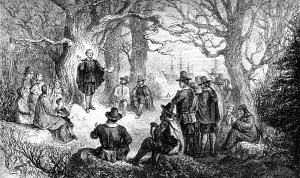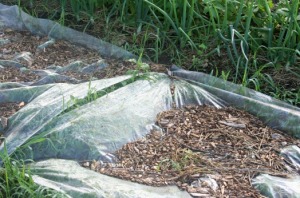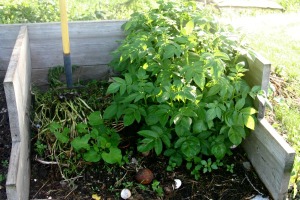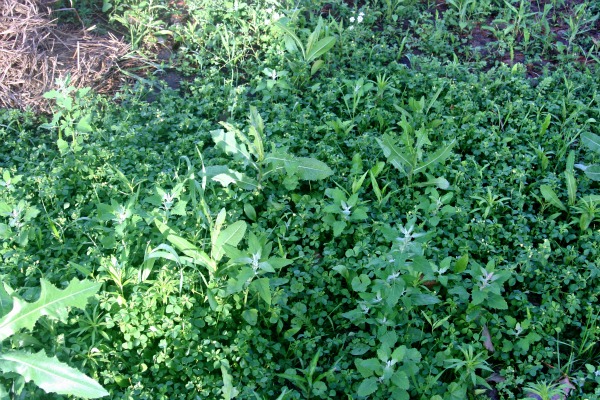 The thesis of Michael Pollan’s Second Nature, it seems to me, is that Americans live in a constantly uneasy relationship between nature and culture. Their relationship to the land: from visions of true wilderness (which exists only in the imagination) to the most pristine suburban lawn, illustrates this tension.
The thesis of Michael Pollan’s Second Nature, it seems to me, is that Americans live in a constantly uneasy relationship between nature and culture. Their relationship to the land: from visions of true wilderness (which exists only in the imagination) to the most pristine suburban lawn, illustrates this tension.
And perhaps no chapter in the book more clearly outlines this thesis than his chapter on weeds. Weeds! Don’t get me started! Emerson, espousing the true romantic position, said a weed is simply a plant whose virtues haven’t been discovered yet. Pollan recounts the story of how dandelions came to America, planted deliberately by settlers who valued them as a salad green. Native Americans also came to value them, and they spread west in time to greet the pioneers when they arrived in “the wilderness.”
Weeds are the place where culture perhaps most clearly dominates our idea of the “natural.” I see it in my landscaper husband every evening, when he sits pouring over his giant weed book identifying the invaders, counseling his clients on what not to plant, and deciding what to spray next. I see it when he heads out into the prairie with his backpack sprayer to kill the nettles, thistles, wormwood and more than a dozen other species of weeds. Many of these plants are beautiful, and some of them (including the nettle) are edible. So what is a weed?
Pollan eventually settles on this definition: “a weed is an especially aggressive plant that competes successfully against cultivated plants.” Just as I thought– weeds are plants that get in the way.
They get in the way of lawns, of vegetable gardens, of beautiful bursts of planted flowers, of “natives,” the flowers we’ve chosen to represent our prairie (whether or not they originally grew in North America or were brought here long ago by the settlers. Is 300 years long enough to be counted as a “native”?) Because really, what we humans are about is transforming our landscape, cultivating our landscape, laying down our cultural values on the landscape and shaping it to provide us with comfort, beauty and food. These days, in addition to beauty, prairies have the virtue of “providing habitat” for bees and birds and other pollinators (in other words, saving the world). For Americans especially, the landscape is a deeply moral place. A place of virtue and judgment. And weeds are sin.
Every year I’m taken aback by weeds. In the hope of carving out more garden from neglected space, my husband cleared and tilled two large areas last fall. In the spring, when they still looked so nice and empty, I laid out the parameters of my raspberry and blueberry bed, heavily mulched them, and planted some sticks that now have sprouted leaves. There was also talk of building some raised beds for the squash vines, but that didn’t happen.
And what do you think is going on out there now?
Let’s just say, I sent Steve out with the backpack sprayer and now I might have lost two blueberry bushes, which he had trouble distinguishing from the rest of the weed patch (I wish I’d put buckets over them first). The “wilderness” asserted itself in a matter of weeks. My sloth (but really, who could have kept back this onslaught?), my untidy spaces, taunt and criticize me.
Steve asked what I’d like to do with those two areas, and I said, “please plant them in fescue.” There is nothing to be done but put in some low-mow grass and then maybe later put the raised beds in. Where I once thought bare ground was the best base for all gardening, I now think that it’s best just to start with a lawn and go from there. The sheer variety and number of weeds is too much (for me) to overcome. And please, enough with the spraying already!
 I spend most of my time in the garden hoeing between the raised beds, chipping out weeds from the gravel. Especially difficult is the tilled plot where I have my potatoes, onions, and this year a row of beans. Although I laid down plastic in the spring, where I didn’t get mulch over the plastic it is bulging up with weeds!
I spend most of my time in the garden hoeing between the raised beds, chipping out weeds from the gravel. Especially difficult is the tilled plot where I have my potatoes, onions, and this year a row of beans. Although I laid down plastic in the spring, where I didn’t get mulch over the plastic it is bulging up with weeds!
But also, I marvel at the fecundity of this cultivated space. Every year I spot a weed I’ve never seen before, and many of them are beautiful. And everywhere I am surprised by what is able to make a go of it out there in what I now see as a wasteland more than a wilderness (weeds, Pollan points out, do best in vacant lots and roadside places, where the ground has been disturbed and then abandoned).
 This year, the best potato plants in the garden are growing in my compost pile! They have nowhere to go (being on a concrete base), and so I bet won’t produce potatoes, but just look at ’em! And the beans coming up next to them! It reminds me of good old Jack tossing those magic beans aside and growing a beanstalk to heaven, or 4-year-old Pollan accidentally planting a watermelon behind the suburban hedge.
This year, the best potato plants in the garden are growing in my compost pile! They have nowhere to go (being on a concrete base), and so I bet won’t produce potatoes, but just look at ’em! And the beans coming up next to them! It reminds me of good old Jack tossing those magic beans aside and growing a beanstalk to heaven, or 4-year-old Pollan accidentally planting a watermelon behind the suburban hedge.
Pollan, in his relationship with gardens, comes to reject Thoreau’s idealism (an idealism that led to Thoreau rejecting his bean field so as to save the St. John’s wort also growing there “naturally”). Thoreau wrote “in wildness is the preservation of the world.” Pollan adds to this a corollary by Wendell Berry, “in human culture is the preservation of wildness.”
It’s too late, Pollan says, to return to a state before Europeans began cultivating the land (and we wouldn’t want to anyway). We have to cultivate. And that means making choices. And for most of us, that is the choice to weed– for the sake of comfort, beauty and food.





Good for Pollan! I read, somewhere and a long time ago, that churches were built to be like arks — protecting people against nature. Midieval art and literature (the most common stuff) is full of both the dangers of nature and a surprising amount of contact with it. That suggests that we inherited the wrong message. Anyway, i couldn’t take sitting in pews anymore — i choose to see my Creator up close and personal; not through a tiny little stained glass window at the back of the churchbuilding.
I love those pictures of people with nature, like this one of the Puritans out having a meeting in the wilderness. Thanks for sharing that part about the ark– a sea of wilderness threatening to drown them! It does sometimes feel that way with the weeds– the forest must have been even more frightening. There is plenty of the Creator to see out in nature.
Good Morning, Susan
Oh the joys of the vegetable garden. When we got back from Mason Lake I was actually thinking of finding a way to build a large raised bed on the west side of our house for a vegetable garden next year. Now as I reconsider the amount of work, I think I’ll just join the CSA again next year. I’ve made friends with a couple farmers at the Farmer’s Market. Emily doesn’t have enough eggs to sell them every week, but she will bring a dozen for me anytime I call her. John has tons of tomatoes (some are heirloom varieties) but not enough help to harvest them. He said I could come pick as many tomatoes as I want when they are ready. My friend, Diane, and I have discussed the idea of picking and canning tomatoes this year …it’s a start.
See you in a week:)
Love, Mom
________________________________
I’ve determined years ago, in my ‘suburban gardening’ mindframe that anything that appears or proliferates where I don’t want it is a weed. Even good plants will fall into that catagory. Though I once let a thistle grow in the middle of my garden, the leaves were so pretty, it was so lush and the flower sweet. Then one morning I woke to it having gone pure evil!
I recently read: “In the garden I may be the master, but the plants hold the final verdict; or rather they do what they can do, not necessarily what I want them to do. In a poem words exert a kindred resistance; I can bend them only so far.” (Robin Magowan) I’m thinking relationships hold to the same terms. So much to learn from the garden; weeds are what keep us on our toes, or literally on our knees!